LEARN MORE: Additional information about the Rev. Martin Luther King Jr.’s six principles of nonviolence is available at The King Center’s website.
BY MELINDA J. OVERSTREET
GLASGOW NEWS 1
The primary guest speaker for the special Martin Luther King Jr. Day service in Glasgow focused his comments on a tenant for which King was well-known – nonviolence.
The Rev. James I. Buford, a Glasgow native who is senior pastor at Williamson Chapel CME Church in Old Hickory, Tennessee, said the increasing violence we see in cities – and even in rural areas — today were not part of the vision held by King, the civil rights leader who was on the receiving end of violence even before he was fatally shot in April 1968.
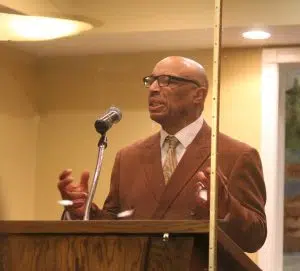
The Rev. James Buford delivers his message about nonviolence during a special Martin Luther King Jr. Day service at First Baptist Church in Glasgow on Monday. MELINDA J. OVERSTREET / GLASGOW NEWS 1
“We have got to learn to settle our many differences in ways that unite us rather than pit us against each other to a point we feel like the only alternative we have left is to become violent,” Buford said to a mostly full house at the First Baptist Church along South Lewis Street in Glasgow.
As something of a preface to his brief discussion about each of the six principles of nonviolence espoused by King, Buford said, “nonviolence does not mean nonresistance.”
“Don’t necessarily mistake meekness for weakness,” the minister said, adding later that even being meek does not mean a person has to be a doormat and allow themselves to be stepped on.
“Sometimes you’ve got to move from protest to contest. Protest is the more formalized expression of your dissatisfaction or discontent …, but contest has to do with a struggle; it’s more physical,” Buford said. “I’m going to give you two more ‘-test’ words. We move from protest to contest, and anybody who participates in a protest or a contest, you are actually attesting to the fact that you find certain things detestable.”
He said we need more folks at all levels of government — from Washington, D.C., on down – to say that they find certain things detestable and they are willing to attest to that by willing to protest and, if necessary, struggle and contest it.
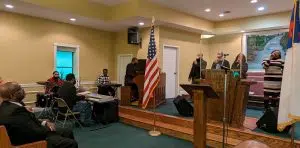
Monday’s special Martin Luther King Jr. Day service at First Baptist Church in Glasgow included musical offerings throughout the program. MELINDA J. OVERSTREET / GLASGOW NEWS 1
“And that’s where we are today,” Buford said. “It bothers me that certain things can happen now and no one says anything about it.”
The reason, he said, is because it’s more politically expedient.
“Some things are so detestable that you must take a stand …,” he said. “But I just want to tell you that you can do all those things and not have to shoot anybody. You don’t have to stab anybody. You can certainly do what needs to be done and be respectful to the person who may not share your view or your opinion. That does not mean you have to be disrespectful. You can disagree without being disagreeable.”
Before King touted the power of nonviolent protest or nonviolent revolution, Buford said, there was Mahatma Gandhi, who employed that revolutionary concept in India.
“Gandhi once said it is the acid test of nonviolence that in a nonviolent conflict, there is no rancor left behind and, in the end, the enemies are converted into friends,” he said, adding that the reason King was so adamant about the nonviolent protest is that he realized, “we’re all in this thing together, and we need each other to make it work.”
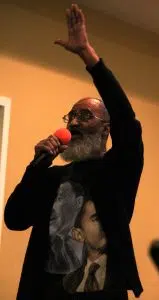
Jaon Barlow, part of the First Baptist Church Praise Team, sings during a special service Monday to observe Martin Luther King Jr. Day. MELINDA J. OVERSTREET / GLASGOW NEWS 1
Buford said that before King or Gandhi, Jesus was teaching nonviolence. He cited Matthew 5:38-48 and Luke 6:27-37, which includes the concept of “turning the other cheek” if someone smites the other. He said Jesus spoke such things so they would understand that the Golden Rule says to do unto others as you would have them do unto you.
It was upon those foundational teachings that King’s preferences for nonviolence are derived.
He then moved into discussing the six principles: 1. Nonviolence is a way of life for courageous people. 2. Nonviolence seeks to win friendship and understanding. 3. Nonviolence seeks to defeat injustice, or evil, not people. 4. Nonviolence holds that unearned, voluntary suffering for a just cause can educate and transform people and societies. 5. Nonviolence chooses love instead of hate. 6. Nonviolence believes that the universe is on the side of justice.
“Peaceful protests and acts of civil disobedience are capable of righting wrongs and even wrongs that are systemic in nature,” Buford said. “Nonviolent protests such as marches and sit-ins and boycotts serve to empower the poor, the needy, the disenfranchised and those who are marginalized to obtain liberty and justice and equality.”
He said that in this moment in this time, we need to understand there’s a great need for Christians and leadership at all levels to make sure we practice brotherly love, adding that we are all brothers and sisters.
“We are the same, even on a genetic level …,” Buford said. “We’ve got to learn how to love one another.”
With love, nonviolence comes, he said.
Prior to Buford’s remarks, several others spoke briefly, including Trevent Hayes, president of the Cave Area chapter of the NAACP; Keith Rowlett, moderator for the Liberty District Association of Baptist Churches; and multiple elected officials – Glasgow Mayor Henry Royse, Barren County Judge-Executive Jamie Bewley Byrd, Circuit Judge John T. Alexander, District Judge Gabe Pendleton, state Rep. Steve Riley and U.S. Rep. Brett Guthrie, who said that of King’s “I Have a Dream Speech,” which had been read by Buford earlier, “If it doesn’t move you, you’re not listening.”
Royse reflected on how the Civil Rights Movement and King’s actions changed the world, including the one right here in Glasgow. He said when he was a kid, the Barren County Courthouse that stood in the center of the Public Square at the time had separate bathrooms for white and “colored” people.
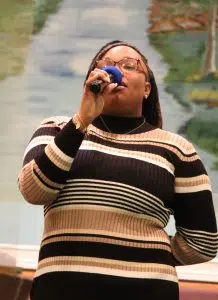
Jaidan Hayes, part of the First Baptist Church Praise Team, sings during a special service Monday to observe Martin Luther King Jr. Day. MELINDA J. OVERSTREET / GLASGOW NEWS 1
“My parents never would let me even see that because they were so embarrassed by that,” he said. “In 1964, that courthouse was torn down … and also what went away was those separate restrooms.”
As a person who grew up here, he said, he has been on the receiving end of many wonderful things that were the result of what King and those who worked with him were able to accomplish. Among them, he said, are the new friends he made as second-grade student in 1964 at Liberty Street School that remained his friends through the years and some to this day. They joined his class from Bunche Elementary School after desegregation.
“It led to the fact that in 1965 at Glasgow High School, 240 students received degrees, including nine African-American kids,” Royse said. “And that was one of the many firsts that we can celebrate thanks to the works of Dr. King and others.”
The man who’s been mayor barely more than two weeks said he was most honored to be there in that role, the same position occupied by the late Luska J. Twyman, from 1968 to 1986.
“He was the first black mayor in this country south of Gary, Indiana, and one of few in the country at the time,” Royse said. “He was also my sixth-grade principal at the time.”
He said Twyman was also the first celebrity he met, because when he became mayor, reporters from all the major networks came calling to interview him.
“In April of that same year was when Dr. Martin Luther King was assassinated,” Royse said.
He concluded by reading an excerpt from a newspaper piece by local historian Sam Terry.
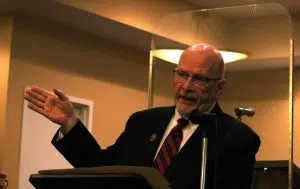
Glasgow Mayor Henry Royse speaks during a special service at First Baptist Church in Glasgow on Monday to observe Martin Luther King Jr. Day. MELINDA J. OVERSTREET / GLASGOW NEWS 1
“When asked what he hoped to achieve as the mayor of Glasgow, Twyman said, ‘Helping the city of Glasgow prove to the world that blacks and whites can live together in harmony. That’s what I want more than anything,’” Royse read, adding, “and that, ladies and gentlemen, is our assignment as we leave here today and as we move forward.”
First Baptist’s pastor, Michael Rice, shared a few words about the difference between service and “serve us,” and how it’s important to remember the difference.
Sprinkled throughout the various sections of the program were spiritual selections performed by the church’s praise team.
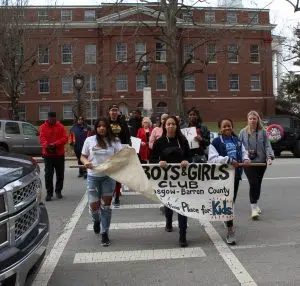
Members of the Boys & Girls Club of Glasgow-Barren County lead the walk from the Barren County Courthouse to First Baptist Church as part of a Martin Luther King Jr. Day observance Monday. MELINDA J. OVERSTREET / GLASGOW NEWS 1
The 2.5-hour special church service followed a walk to the church led by members of the Boys and Girls Club of Glasgow-Barren County the 0.7 miles from the Barren County Courthouse, where several people gathered at noon for brief comments, a song – “This Little Light of Mine” – and a prayer. Approximately 50 people participated in the peaceful march, often singing additional songs along the way.
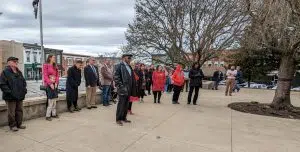
Community members gather in front of the Barren County Courthouse on Monday in observance of Martin Luther King Jr. Day. MELINDA J. OVERSTREET / GLASGOW NEWS 1
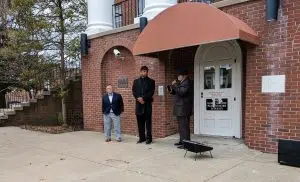
District Judge Gabe Pendleton, from left, and Chris Curry look on as Michael Sublett speaks at a Martin Luther King Jr. Day observance Monday in front of the Barren County Courthouse. MELINDA J. OVERSTREET / GLASGOW NEWS 1
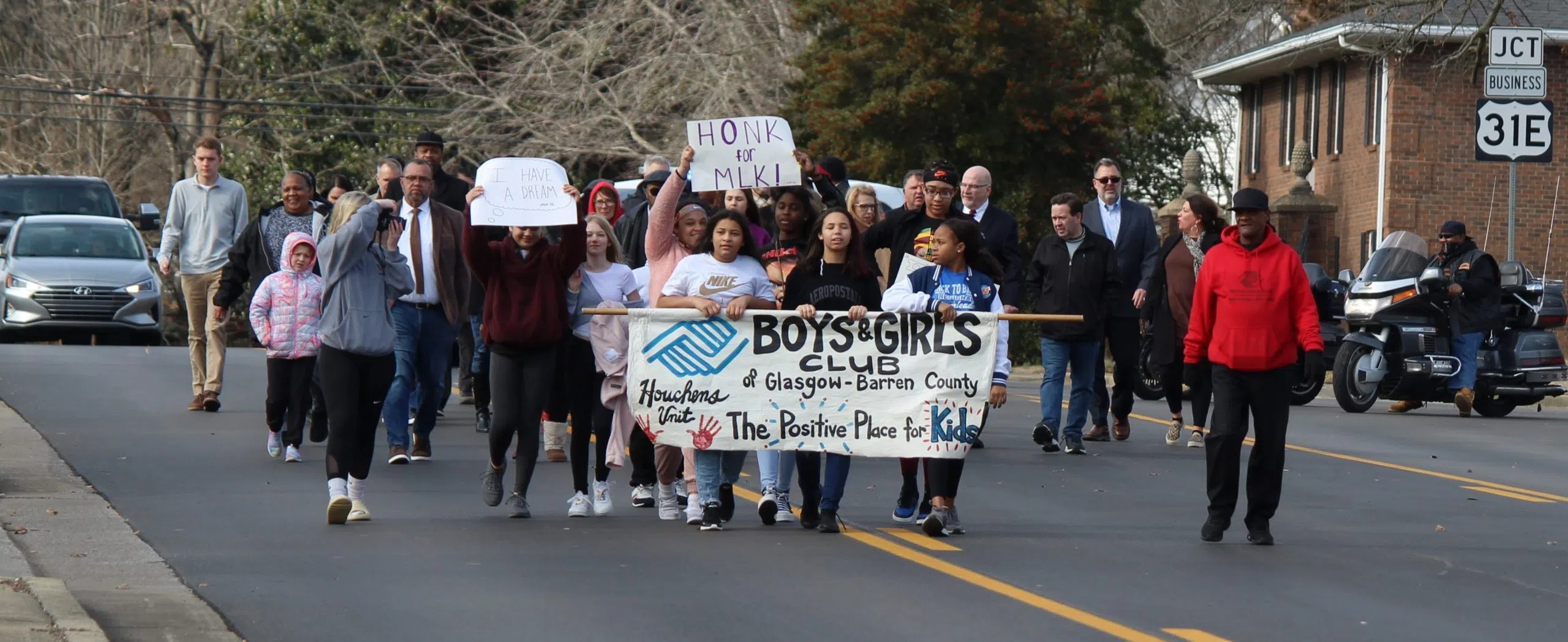
Comments